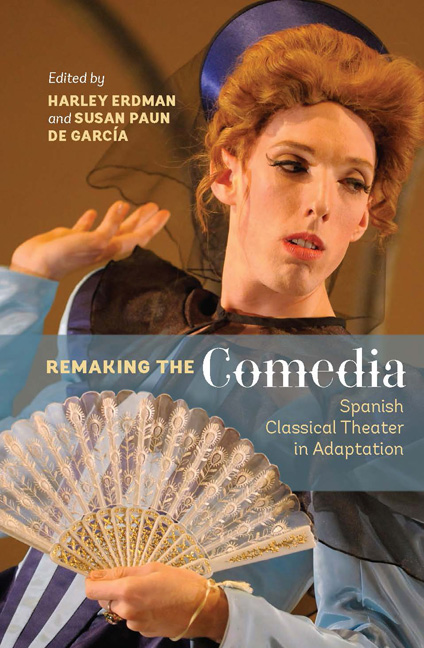Book contents
- Frontmatter
- Contents
- Illustrations
- Contributors
- Preface
- Note to the Reader
- Acknowledgements
- PART I THEORIZING
- PART II SURVEYING
- PART III SPOTLIGHTING
- 11 The Dog in the Manger: The Continuum of Transformation
- 12 El caballero de Olmedo: Los Barracos's Baroque Gentleman
- 13 Corpus Lorqui: Transformation and Transubstantiation in Los Barracos de Federico’s El caballero de Olmedo
- 14 The Phoenix of Madrid: Calderón's No hay burlas con el amor Reborn in Bath
- 15 A Prince in Pittsburgh: “Recasting” a Contemporary Staging of The Constant Prince
- 16 Directing Marta the Divine: Provocative Choices in the Service of the Story
- 17 The Dramaturgy of Absence: Minding the Gaps in Tirso de Molina, Ana Caro, and Feliciana Enríquez
- 18 Translations and Transgressions: Twenty-First-Century Questions Regarding Zayas
- 19 Comedia Actresses, Then and Now: The Case of Ana Caro's Valor, agravio y mujer
- 20 “Kinesthetic Empathy” and the Comedia refundición
- PART IV SHIFTING
- Play Titles Cited
- Works Cited
- Index
15 - A Prince in Pittsburgh: “Recasting” a Contemporary Staging of The Constant Prince
from PART III - SPOTLIGHTING
Published online by Cambridge University Press: 05 December 2015
- Frontmatter
- Contents
- Illustrations
- Contributors
- Preface
- Note to the Reader
- Acknowledgements
- PART I THEORIZING
- PART II SURVEYING
- PART III SPOTLIGHTING
- 11 The Dog in the Manger: The Continuum of Transformation
- 12 El caballero de Olmedo: Los Barracos's Baroque Gentleman
- 13 Corpus Lorqui: Transformation and Transubstantiation in Los Barracos de Federico’s El caballero de Olmedo
- 14 The Phoenix of Madrid: Calderón's No hay burlas con el amor Reborn in Bath
- 15 A Prince in Pittsburgh: “Recasting” a Contemporary Staging of The Constant Prince
- 16 Directing Marta the Divine: Provocative Choices in the Service of the Story
- 17 The Dramaturgy of Absence: Minding the Gaps in Tirso de Molina, Ana Caro, and Feliciana Enríquez
- 18 Translations and Transgressions: Twenty-First-Century Questions Regarding Zayas
- 19 Comedia Actresses, Then and Now: The Case of Ana Caro's Valor, agravio y mujer
- 20 “Kinesthetic Empathy” and the Comedia refundición
- PART IV SHIFTING
- Play Titles Cited
- Works Cited
- Index
Summary
This is a story of refundición por necesidad. All of us who love the drama of the Siglo de Oro and want to see it on Anglophone stages inevitably face challenges in finding hospitable venues. Considerations of form, style, theme, translation, and sheer scale (and within the friendly confines of this volume let's not forget unfamiliarity) pose apparently insurmountable obstacles, based on the statistical paucity of Golden Age productions in the American theater and academy. So would-be directors of this great body of work must prepare for a non-linear journey between desire and fulfillment, beginning with an idea, progressing through the search for a venue, and ending with the shape and reception of the production itself.
I have long felt that there should be a natural affinity between Shakespeare theaters, as a group, and the drama of the Spanish Golden Age. Folks in the Shakespeare business, and their audiences, should have an ear for poetry, an eye for image, a taste for rhetoric, a tolerance for amplitude, and an insatiable lust for big ideas. We must be careful, of course, not to make a facile equivalence between Elizabethan–Jacobean drama and the Siglo de Oro; the differences in dramaturgy and thematic range (conditioned by cultural imperatives that also differ) are profound, and woe to those who try to see one body of work wholly through the other's lens. One or the other will suffer, and much native excellence will be missed. But the big inputs sketched above, the requirements they place on actors and directors, and the corresponding “tuning” of the audience's perceptual equipment do seem to be shared between those twin pinnacles of European drama.
Why every Shakespeare theater and festival (and I here celebrate the ground-breaking work of the Royal Shakespeare Company's Golden Age season and the stirrings of interest at the Shakespeare Theatre in Washington d.C.) does not make a regular practice of including this work, to the delight of their audiences and artists, is a subject for a different day.
- Type
- Chapter
- Information
- Remaking the ComediaSpanish Classical Theater in Adaptation, pp. 143 - 154Publisher: Boydell & BrewerPrint publication year: 2015



